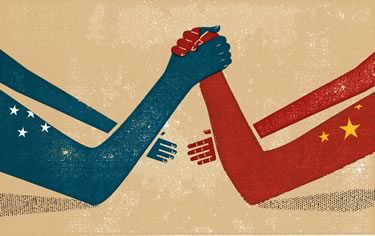After the global meltdown of 2008, while the United States was distracted by economic recovery and disengaging its troops from Iraq and Afghanistan, a new war quietly began. Many Americans have yet to realize the world-changing implications of the conflict between the United States and China that is the focus of Harvard Law Professor Noah Feldman’s new book, “Cool War: The Future of Global Competition” (Random House).
After years of thinking about and writing on Islam and democracy, the last decade’s pivotal conflict, Feldman has turned his focus on the tense pas de deux entwining China “with its still inchoate and forming system of government” and the United States “with its strong conceptions of democracy and the rule of law and human rights.” He uses the term “Cool War” to invoke an “unprecedented historical situation” in which the world’s fastest-growing power and the established dominant power “have at the exact same time a dynamic of cooperation and interdependence in the economic sphere, and a dynamic of conflict and diverging interests in the geopolitical sphere.”
In 2012, China-U.S. trade exceeded $425 billion in goods. Exports to the United States account for nearly 25 percent of Chinese trade, while the Chinese government owns 8 percent of America’s outstanding debt and invests billions in U.S. companies. In addition, Feldman notes, more than 150,000 Chinese nonimmigrant citizens now reside and study in the United States, with perhaps half that many Americans living in China, and there is frequent contact between government officials on both sides as well—a depth of exchange unimaginable in the Iron Curtain era.
Therein lies the “paradox” of the Cool War, says Feldman: While the United States and China race to claim allies and resources to weaken each other, simultaneously, they are cooperating in trade and in international affairs in ways that make them each stronger.
But as competition between the two powers intensifies, this balance could tip and turn the Cool War hot. Feldman cites some potential “flash points”: the Korean peninsula, where China’s ally North Korea threatens U.S.-backed South Korea, and Taiwan, where Sino-U.S. ties are strained by China’s push for unification. “A longer-term risk is that a rising China will eclipse U.S. interests and security arrangements in Asia, bringing not only Taiwan but also South Korea and Japan within its sphere of influence and control, fundamentally changing the global balance of power,” Feldman says.
The Cold War was an ideological battle on both sides; each thought its worldview was unassailable. In contrast, “China’s leadership is extremely pragmatic; they don’t think that everybody has to adopt their way of doing things, and they don’t mind if we do things our way,” Feldman explains. In fact, this time, the ideology is on the U.S. side: “We reject the idea that a state can be just without the rule of law and democracy and human rights.”
As a result, many misinterpret China’s political system. The casual U.S. observer notes the fact that China is a one-party state and concludes it is a pure dictatorship, “but that is totally wrong,” Feldman says. Dictatorships struggle and fall with power transfers, whereas the Chinese Communist Party has successfully turned over its leadership three times, in 1992, 2002 and 2012, with the reigning cohort of male leaders making way for a younger one each time.
China’s “pragmatic experimentalism” is driving other significant changes, too. More leaders are selected for proven abilities, infusing the system with new talent. These meritocrats share power with the hereditary “princelings,” relatives of the senior leaders, in what Feldman calls the Chinese Communist Party’s “permeable elite.”
The party has also realized value in tolerating limited free speech, especially on the Internet, typically following a public event or controversy. It soon shuts down these short bursts of opinion, and deploys its “Great Firewall” to censor, but even fleeting free speech enables the government to react to public sentiment and convey accountability.
The biggest threat to China’s political stability is corruption. “The perception that the party is only in it for itself, that its members are ripping off the country, is a terribly threatening one,” says Feldman. China’s new leadership has made curbing corruption a priority and recently announced regulations to prohibit spending on official hospitality, including limiting the size of party-hosted public banquets notorious for their excess.
“A well-meaning person watching China naturally wants to see greater respect for human rights and freedom of speech, and wants to see a fairer system and less corruption,” says Feldman. “But from a broader U.S. perspective, those improvements will make China stronger and the United States weaker.”
The central lesson of the Cool War, according to Feldman, is that “economic interdependence can be leveraged to help manage real political conflict.” How well the U.S. and China continue to cooperate while competing ferociously has profound implications for other nations, international institutions such as the U.N. Security Council and WTO, global corporations, human rights efforts, and much more. Says Feldman: “Those are the rules of the game in this Cool War, and they’re very different and strange new rules.”

